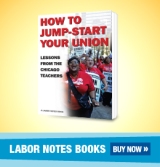by Chris Tiedemann
Beyond the Fields: Cesar Chavez, the UFW and the Struggle for Justice in the 21st Century.
 During the 1960s and 1970s, many of the new generation’s best legal minds were staff attorneys for the United Farmworkers of America (UFW). Led by Jerry Cohen, the UFW’s legal team continually out-strategized big growers; the latter had the best attorneys money could buy, but the UFW had brilliant lawyers who could not be bought. Randy Shaw, a longtime Bay Area attorney and Director of the Tenderloin Housing Clinic, acknowledges the ccomplishments of these UFW attorneys in his new book from the University of California Press, Beyond the Fields: Cesar Chavez, the UFW and the Struggle for Justice in the 21st Century.
During the 1960s and 1970s, many of the new generation’s best legal minds were staff attorneys for the United Farmworkers of America (UFW). Led by Jerry Cohen, the UFW’s legal team continually out-strategized big growers; the latter had the best attorneys money could buy, but the UFW had brilliant lawyers who could not be bought. Randy Shaw, a longtime Bay Area attorney and Director of the Tenderloin Housing Clinic, acknowledges the ccomplishments of these UFW attorneys in his new book from the University of California Press, Beyond the Fields: Cesar Chavez, the UFW and the Struggle for Justice in the 21st Century.
Beyond the Fields reveals the untold story of how the legacy of Cesar Chavez — and the strategies and tactics of the UFW in its heyday — continue to set the course for today’s social justice movements. It also traces for the first time how UFW alumni have played leading roles in these movements.
Beyond the Fields follows in the tradition of Howard Zinn’s A People’s History of the United States, by providing little known history about the UFW, its organizing tactics and its profound legacy on political activism in America over the past four decades. The book provides a historic overview of the UFW, its leaders — particularly Chavez — its achievements, and the lasting impact of tactics developed and used by the UFW on organizing around the country. Many of the stories of post-UFW social justice struggles in Beyond the Fields are riveting, including a description of the Justice for Janitors campaign in Miami and a history of the national immigrant rights movement. Shaw describes how a key building block for this movement was the Immigrant Workers Freedom Ride in 2003, an event in which the National Lawyers Guild played an important role.
The book is particularly timely because of the use of UFW organizing strategies in the ground game to elect Barack Obama. Shaw traces the roots of Obama’s vaunted field campaign back to the organizing genius of Fred Ross, who recruited and mentored Chavez during the 1950s, and whose voter outreach strategies became part of the UFW during the 1960s.
Shaw shows how the UFW’s voter registration and “get out the vote” drives for Robert Kennedy in 1968, and for the California state ballot initiatives in 1972 and 1976, trained a generation of activists in how to win elections through grassroots organizing. UFW alums, including Marshall Ganz and Miguel Contreras, then took the UFW electoral model beyond the fields, expanding Latino voting to transform politics in Los Angeles, California, and now the nation.
Shaw lists many of the UFW attorneys who worked for justice after leaving the union, and discusses their post-UFW positions. He also describes why Jerry Cohen and most of his legal team left the UFW, and how growers conspired to deny Cohen a seat on the Court of Appeal.
Shaw notes that one of his goals in writing the book was to rectify the lack of public recognition of UFW veterans, and to give them thanks for their years of fighting for social justice. His book fulfills that goal.
Great as it will be to have Obama in the White House, Obama’s election isn’t a magic solution to the country’s many and deep social problems. Shaw’s book provides valuable history to guide activists in the battles to come, and is an inspiring read.
For more information about the book, see http://beyondthefields.net.
Additional commentary from Duane Campbell:
The book is excellent and deserves a read. The sections of this book on the immigrant rights movement are weak (in terms of how and why the AFL-CIO position changed). They overstate the role of Eliseo Medina, without mentioning that he is a DSA Honorary Chair, and understate the role of 20 years of organizing by Bert Corona and the folks around Hermandad Mexicana. The author is very generous to the SEIU and Medina. The author also understates the issue that many of the people portrayed as pro-immigrant activists in the book went on to support the big guest-worker/enforcement bills of the last few years. This is particularly a problem with the folks working within and near the SEIU. This division within the unions remains today.
See Origins of the Obama Organization.
Chris Tiedemann is a member of the National Lawyers Guild Bay Area Chapter
Filed under: Book Reviews, Immigrant Workers, Labor History, Organizing | Tagged: Cesar Chavez, UFW |





[…] (c) Copyright 2009, Michael Yates. All rights reserved. Michael Yates is Associate Editor of Monthly Review. A new edition of his book, Why Unions Matter, is just out. His blog is here. For a different take on Shaw’s book, see Chris Tiedemann’s review here. […]